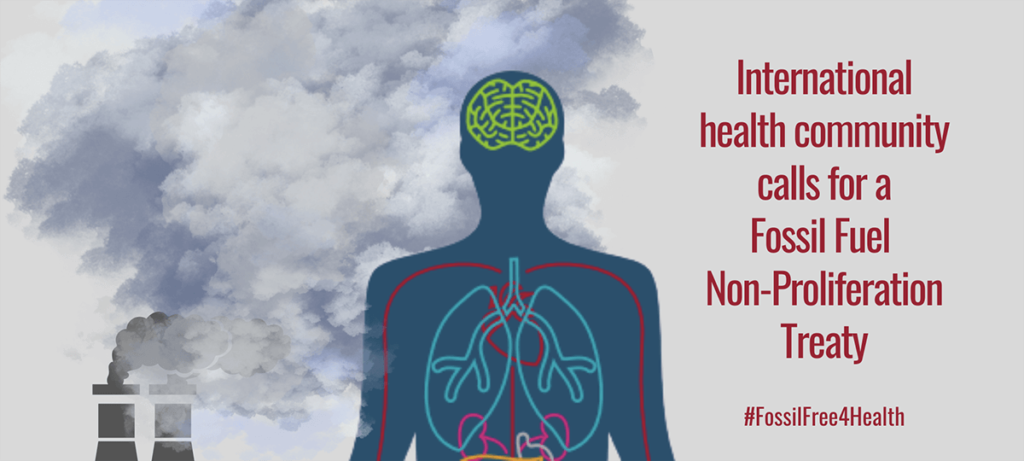More than 1000 health professionals and nearly 200 health organizations from around the world – including the World Health Organization – are calling upon governmentsto lay out a legally binding global plan to phase out fossil fuel use, in order to protect the health of people around the world. Joining the WHO other major signatories include the International Pediatric Association, the World Medical Association, the Alliance of Nurses for a Healthy Environment, and the World Federation of Public Health Associations.

Despite nice sounding promises at international fora, recent analysis by the Organization for Economic Co-operation and Development (OECD) and the International Energy Agency indicates a sobering reality: major economies are sharply increasing support for the production and consumption of coal, oil and natural gas, with support for fossil fuels almost doubling in 2021, slowing progress toward international climate goals.
GCHA, together with the World Health Organization and health civil society and academic partners, have been monitoring this trend, and in August filed a joint submission to the UNFCCC Global Stocktake, which will assess progress countries have or haven’t made in implementing the Paris Agreement, and how much countries must increase the ambition of their national climate action plans (the NDCs) in order to limit warming to the targets set in the Paris Agreement
We are well past time for governments to tackle head on the root causes of climate change. As Dr Tedros Adhanom Ghebreyesus, Director-General of the World Health Organization, said, “The modern addiction to fossil fuels is not just an act of environmental vandalism. From the health perspective, it is an act of self-sabotage”.
Fossil fuels are an outmoded source for the energy we need as a society. The risk fossil fuels pose at every stage of the process have become crystal clear over the decades they’ve been in use. We’ve seen black lung disease in coal miners, have seen oil spills damage fisheries that are key to people’s livelihoods and diets, we’ve seen chemicals from the fracking process contaminate people’s drinking water. And every single year we see millions of deaths from air pollution. The convenience of fossil fuels as an energy source has come with a deadly price tag in people’s health.
We now have better alternatives, energy options that are cleaner and more sustainable – and compatible with the healthier future we want. With that healthier future in mind, last year, the health community came together around a call to justly and rapidly phase out fossil fuels in the Healthy Climate Prescription, supported by organizations representing 46 million health professionals. A fossil fuel non-proliferation treaty would establish a legally binding international mechanism through which to make phasing out coal, oil and gas a reality
The call for a fossil fuel treaty has three key components: immediately stop development of new fossil fuel production and infrastructure; wind down existing fossil fuel production and use, in an internationally fair and coordinated way; and finally, provide for a just transition, with support to develop new livelihoods, for the workers and communities affected as fossil fuel jobs are wound down.
People and communities need access to energy – for cooking, cleaning, transport, for schools and hospitals, for businesses and industries. Clean energy access is vital for lifting people out of poverty, supporting economic development, delivering education and health care, and many other determinants of health. High income countries, having benefited from using fossil fuels for decades, have both the resources and moral responsibility to rapidly make the clean energy transition themselves, and to assist developing countries to do the same. We can and we must eliminate poverty as we eliminate fossil fuels.
Fossil fuels are incompatible with the healthy and equitable future we want. It’s time for governments to get serious about phasing them out, and to transitioning to clean energy, for healthy people on a healthy planet.
by Jeni Miller, Executive Director, Global Climate and Health Alliance
*** Find out more in GCHA press release, 14 September 2022 ***

